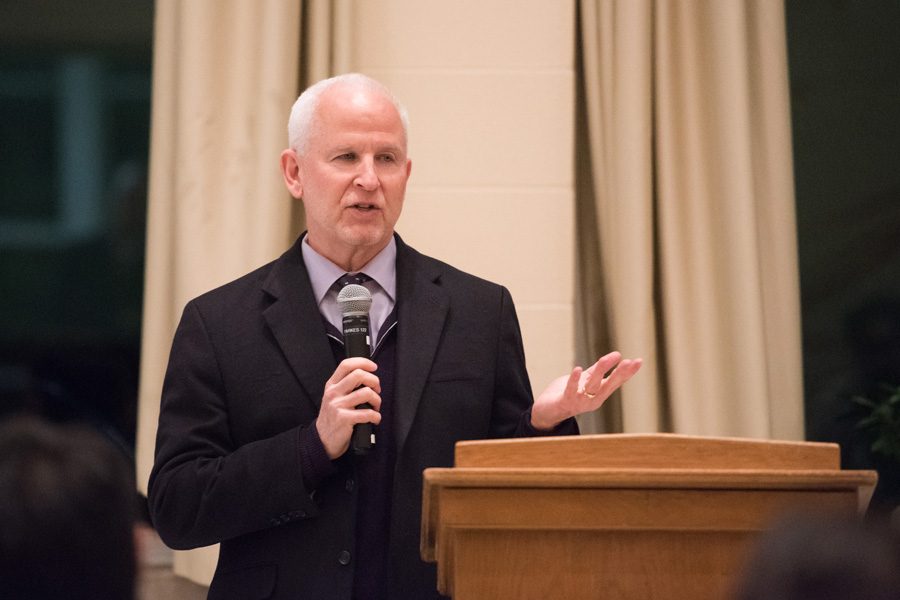Campus faith communities gather to discuss sacred spaces, allyship
Lauren Duquette/Daily Senior Staffer
University President Morton Schapiro speaks at Fall Faith Fest on Monday. Schapiro said Northwestern’s religious and spiritual community is more vibrant than communities at many other secular universities, which he views as a point of strength.
November 15, 2016
Following this year’s presidential election, it is more important now than ever to find strength in community, University President Morton Schapiro said Monday at Fall Faith Fest.
The annual event, organized by the Office of Religious and Spiritual Life, brought together members of Northwestern’s different faith communities to celebrate religious diversity and discuss ways to support marginalized identities. Schapiro, along with associate University chaplain Tahera Ahmad and alumnus Michael Knudsen (Weinberg ’15), an advocate against the Dakota Access Pipeline, spoke at the event to more than 100 attendees.
Schapiro said NU’s religious and spiritual community is more vibrant than communities at other secular universities, which he views as a point of strength. As an observant Jew, Schapiro always felt welcomed at NU, he said, and he hopes students and staff of all other faith identities feel the same. After Donald Trump’s victory in the presidential election, protecting faith communities is an even greater priority, Schapiro said, though he never mentioned the president-elect by name.
“I’ve been in places where they say anyone who has a religious faith is being superstitious,” he said. “I don’t find that here. We can get together, particularly when times are tough. And I have to tell you, I don’t know when times have been tougher than they are now … the challenge we all have not just to retreat into ourselves but to act and act in the right way. ”
After Schapiro’s remarks, several students were recognized for being leaders in faith communities on campus and received imported bonsai trees. Ahmad presented the last tree to Schapiro for his work advocating safe spaces on campus. The trees represented the recipients’ deep roots in their faiths and their resilience in the face of challenges, Ahmad said.
“We’re at a time where it’s important to recognize the good that is there in people and to really engage with each other … in order to achieve equity and not just equality for all people,” Ahmad said when recognizing Schapiro. “Thank you for being an ally. We recognize that we are in difficult times, and we appreciate that you with the administration are supporting us.”
Afterward, Knudsen, who is originally from Bismarck, North Dakota, discussed his work advocating against the Dakota Access Pipeline and how people can be a productive ally toward marginalized identities.
In reference to the recent presidential election, Knudsen said racial prejudice has always existed, and people should not be surprised by Trump’s victory. Rather, people with privilege should work with those of marginalized identities to fight racism, he said.
“Before (what happened Wednesday), we had 1492,” Knudsen said. “We had colonization throughout all of the Americas. It’s really pertinent to what’s happening at Standing Rock. All of that has been happening since then.”
Linda Black Elk, an ethnobotanist and Standing Rock reservation resident, skyped into the event. She said the pipeline would go through land held sacred to native peoples and threaten local water supplies.
Black Elk, who is also a professor at Sitting Bull College, spoke about native peoples’ history and cultural suppression by federal actions such as boarding schools. The pipeline is just the latest in a history of abusing native peoples, she said.
“It’s not just about the water,” she said. “We are literally facing a military force. … We are basically having to fight to refuse a pipeline that white folks in Bismarck were allowed to say no to.”
Medill senior Medha Imam, who helped emcee the evening, said the topics of protecting community and productive allyship were pertinent to national issues such as the Dakota Access Pipeline and the recent presidential election.
“The most important thing is knowing that people here can become allies for each other in upcoming struggles that we will face,” she said. “It’s important to take a step back and try to understand what’s going on in each and everyone’s lives.”
Email: [email protected]
Twitter: @matthewchoi2018


